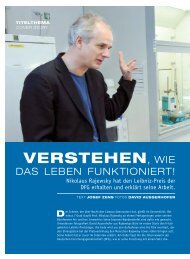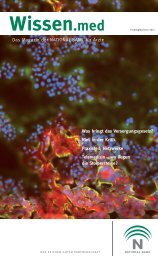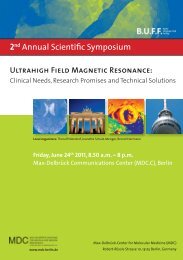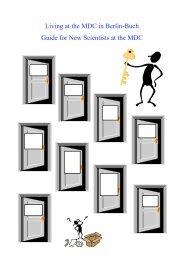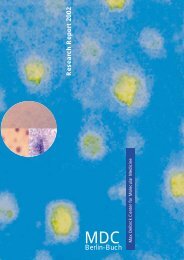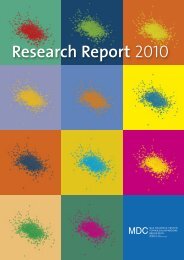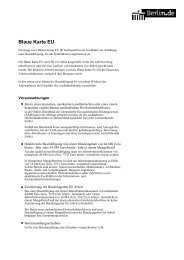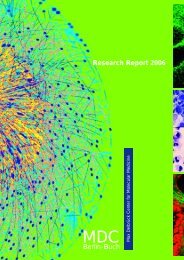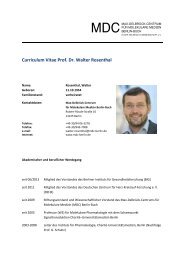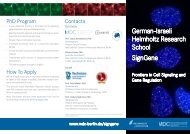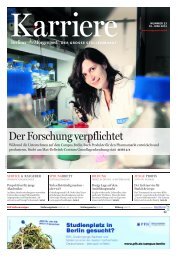PhD brochure - MDC
PhD brochure - MDC
PhD brochure - MDC
- No tags were found...
Create successful ePaper yourself
Turn your PDF publications into a flip-book with our unique Google optimized e-Paper software.
Prof. Walter RosenthalScientific Director, <strong>MDC</strong>“Your time as a doctoral student is the most important station in your scientificcareer. It will have a profound influence on your future research and life. The <strong>MDC</strong>and the campus Berlin-Buch offer a wonderfully rich research environment and asupportive Graduate School framework, and I advise you to take full advantage ofthe opportunities you find here. We have strong, interdisciplinary groups in whichyou can approach biological questions from multiple perspectives, cutting-edgetechnology platforms which you can combine in unique ways to answer them,and a mix of experimental and clinical groups working on fundamental questionswith therapeutic applications. Our campus is home to around 50 biotechcompanies, the leading biotech cluster within the health region of Berlin, whichare bringing the fruits of biomedical research to the marketplace. To prepareyou for the future, we are continually expanding the scope of our doctoralprogrammes to encompass new themes. Ultimately, our research will contributeto shape the future of biomedicine and have great impact on society, and ourstudents play a crucial role. I‘m delighted to welcome you, and I‘m lookingforward to the contributions you will make to our work and our campus! ”Welcome to the <strong>MDC</strong>!Prof. Achim LeutzHead of theGraduate School, <strong>MDC</strong>“As you come to the end of your undergraduate studies you will be facedwith many options. If you choose to undertake a <strong>PhD</strong> you will gain invaluableskills – clear and rigorous scientific thinking, the ability to dig your waythrough and understand complex information, to generate knowledge, andthe independence that comes with pursuing your own research project. Thisexperience will set you apart and stay with you for the rest of your life. At the<strong>MDC</strong> we support the development of your research skills according to yourpersonal interest. Our training programmes and supervision structure give youall the support you need without hampering your freedom to explore your ownresearch. You will join a large international scientific community where you cantap into a wealth of knowledge, expertise and resources, forging professionaland personal relationships that will see you through your career. We would beproud to accompany you on these important steps into the world of researchscience.”2
home to an international community of1500 scientists and support staff60 independent research groupsannual institutional budget of e70mplus e25m in third party fundingWho are we?The Max Delbrück Center for MolecularMedicine (<strong>MDC</strong>), a member of theHelmholtz Association, is a majorbiomedical research institute in Berlin.www.mdc-berlin.de4
The Helmholtz Association is the largest scientific organisation in Germany. An annual budget ofmore than e3.4 billion finances 18 research centres and 34,000 staff members. Its remit is to pursuelong term research goals on behalf of the German state and society. The Helmholtz Association’s5000 graduate students conduct research in the key areas of energy, earth and environment, health,key technologies, structure of matter, aeronautics, space and transport.The <strong>MDC</strong> is the leading German nationalresearch institute in the field of molecularmedicine. This is a broad, cross-disciplinaryarea connecting fundamental discoveries inthe laboratory with the field of medicine andaims to develop new strategies and therapiesto improve human health. The translation ofbasic findings into more personalised medicalpractice and new bed-side technologies is achallenge that the institute has taken on.Founded 20 years ago, the <strong>MDC</strong> already hasa strong international reputation. Its scientists– many of them leaders in their fields– publish on average one research paper perday. Since its foundation, the <strong>MDC</strong> has grownfrom 400 to more than 1500 employees, representing55 nationalities. Our mission – to beat the forefront of fundamental biomedicalresearch – is supported by the ongoing developmentof our infrastructure and facilities,including expansion of the Berlin Institute forMedical Systems Biology (BIMSB), developmentof modern facilities for translationalmedicine in the Experimental and ClinicalResearch Centre (ECRC), a unique Ultrahigh-Field MR Facility, and a newly-planned In VivoPathology Laboratory.Located on the Berlin-Buch campus, the <strong>MDC</strong>is embedded in an environment of modernbiomedical science, health and the leadingbiotechnology park in Berlin. The instituteworks closely with the campus neighbour,the Leibniz Institut für Molekulare Pharmakologie(FMP), sharing facilities and severaljoint research groups. We are well placedto tap into the wider scientific network ofBerlin, a city renowned for its high density ofscientific institutions. The <strong>MDC</strong> has establisheda range of institutional collaborationswith all the major natural sciences institutesin Berlin, including the Max Planck Institutes,the Humboldt Universität zu Berlin, the FreieUniversität Berlin, and the Charité UniversitätsmedizinBerlin.We are committed to meet today’s challengesin biology and medicine and realisethat excellent science requires outstandingresearchers. If you aspire to be one of them –welcome to the <strong>MDC</strong>!“My graduate research at the <strong>MDC</strong> allowed me to develop an excitingproject with outstanding support from my <strong>PhD</strong> adviser Thomas Sommerand our group. I was trained to use biochemistry, cell biology, and geneticsin a complementary fashion, and combining these approaches now is acenter piece of my own research group at Yale University.”Prof. Dr. Thomas Biederer, <strong>PhD</strong> Alumnus, Yale University www.biederer.yalemedicine.org5
From today’s science totomorrow’s medicineResearch is organised into the areas ofCardiovascular and Metabolic DiseasesCancer BiologyNeurobiologyMedical Systems BiologyMolecular Medicine at the <strong>MDC</strong>Science at the <strong>MDC</strong> spans four basic researchareas and translational research – bringingthe latest discoveries from bench to bed-side.The work of our 60 research groups rangesfrom structural biology, imaging, cell biology,developmental biology, animal models,clinical studies, biophysics, bioinformatics &computational biology to genome biology,covering the whole spectrum of molecularlife sciences. Such a diverse portfolio fuelscollaboration. This, combined with theintegration of high-end technologies and thedevelopment of new methods by our technologyplatform facilities, means that ourinstitute competes at a truly internationallevel.“I came from Colombia to do my <strong>PhD</strong> in neuroscience in the MolNeuro Research School atthe <strong>MDC</strong>. I was attracted by the possibility of having access to advanced technology thatwe don’t have in my country. I’ve now been here for three years and I can say that I did findthat technology and also helpful people to discuss it with.”Yinth-Andrea Bernal-Sierra, <strong>PhD</strong> student, Columbia6
Medical Systems BiologySystems biology has the potential to revolutionisemedicine towards personalisedtreatments. Meeting this challenge requiresa multidisciplinary approach integratinghigh-throughput technologies, mathematics,bioinformatics, molecular biology, biochemistryand engineering to derive predictive, quantitativemodels for biological systems. TheBerlin Institute for Medical Systems Biology isa major program at the <strong>MDC</strong>. Several groupsfocus their research on understanding posttranscriptionalregulation of the genome.Facilities residing within the BIMSB includedeep sequencing, mass spectrometry forproteomics and metabolomics, bioinformaticsand mathematical modelling.Areas of special emphasisat the <strong>MDC</strong>Translational Medical ResearchLong-standing collaborations between the<strong>MDC</strong> and Charité-Universitätsmedizin Berlinmedical faculty help bridge the traditional gapbetween basic biomedical science and clinicalresearch. The joint Experimental and ClinicalResearch Center (ECRC) includes both outpatientclinics and research facilities, supportingclinical studies and enabling close collaborationbetween basic and clinical scientists. Amajor facility at the ECRC is the Ultrahigh-Field Magnetic Resonance unit, equipped withworld-class animal (9.4 Tesla) and whole-body(7.0 Tesla) MR scanners.Technologies on campusMagnetic Resonance Tomography | Confocal and TwoPhoton Microscopy | Electron Microscopy | MathematicalCell Physiology | Deep Sequencing | Mass Spectrometry |Bioinformatics & Mathematical Modelling | Transgenics |In vivo Mouse Phenotyping | Preparative Flowcytometry |Protein Sample Production | Micro-Arrays7
<strong>MDC</strong> Research Groups
HelmholtzGraduate SchoolMolecular CellBiologyThe graduate school hosts 350 <strong>PhD</strong>students from 39 countries8
<strong>MDC</strong> International <strong>PhD</strong> ProgrammeThe Helmholtz Graduate School “MolecularCell Biology” is a collaboration between theMax Delbrück Center for Molecular Medicine(<strong>MDC</strong>) and the Humboldt-Universitätzu Berlin (HU), Freie Universität Berlin andCharité-Universitätsmedizin Berlin medicalfaculty. We offer, alongside outstanding researchtraining, an interdisciplinary platformfor structured <strong>PhD</strong> training to all doctoralstudents at the <strong>MDC</strong>. The graduate schoolcurrently supports 350 <strong>PhD</strong> students, onethird of whom come from abroad.The research diversity offered by the 60groups working at the <strong>MDC</strong> covers theareas of cardiovascular research, metabolicresearch, cancer biology & immunology,developmental biology, medical systemsbiology, bioinformatics, structural biologyand molecular neurobiology. The programmecombines academic research, education andtraining from accomplished professors andresearchers, access to high-end technologyand collaborations, all within the campus.Research training is supplemented withteaching lectures in the main research areas,methods workshops, introductions to newtechnologies, soft-skills courses and opportunitiesfor career development to foster thepersonal and scientific development of ourstudents. To help our students keep track ofthe various activities and courses during their<strong>PhD</strong>, the Graduate School operates a CreditPoint System for courses and conferencesattended and participation in career developmentactivities. This helps students to structuretheir training so that it meets individualneeds and interest.“To improve the analysis of my data and my experimental plans, I applied tojoin the Cold Spring Harbor Laboratory course “Eukaryotic Gene Expression”.The travel funds from our Graduate School together with funds from my labcovered all the course costs and gave me not only the opportunity to learntheoretical and practical aspects of new methods that I could apply in my <strong>PhD</strong> work,but also brought me up-to-date with the whole gene expression field. The discussionswith other participants, instructors and guest lectures about the current problems anddevelopments in this field were a priceless experience.”Kivia Aparecida Pontes de Oliveira, <strong>PhD</strong> student, Brazil9
Listen and LearnAttending teaching lectures helps our students to get an overview of different subject areasand to get up to date with the state of the art in those fields. A packed programme of researchseminars, featuring both local and international speakers, connects our students with thebroader scientific community.Teaching Lecture SeriesMolecular Cell BiologyMolecular PharmacologyBIMSB HU Ringvorlesung Medical Systems BiologyMolecular Neurobiology ‘MolNeuro’Cardiovascular Disease Research ‘TransCard Lecture’Research SeminarsStudent Seminar in Systems BiologySeminar in Haematopoiesis and Leukaemogenesis ‘Freshblood’Developmental Biology Seminar SeriesSeminar Series in Medical Systems BiologyCardiovascular Research Student SeminarWollenberger Seminar in Cardiovascular & Metabolic DiseaseReada few publication highlights from our current students:Baltz AG et al. (2012) The mRNA-Bound Proteome and ItsGlobal Occupancy Profile on Protein-Coding Transcripts.Mol Cell. 46(5):674-90.Guo W and Schafer S et al. (2012) RBM20, a gene forhereditary cardiomyopathy, regulates titin splicing.Nat Med. (5):766-73.Lebedeva S and Jens M et al. (2011) Transcriptome-wideanalysis of regulatory interactions of the RNA-bindingprotein HuR. Mol Cell. 43(3):340-52.Heidenreich M et al. (2011) KCNQ4 K(+) channels tunemechanoreceptors for normal touch sensation in mouseand man. Nat Neurosci. 15(1):138-45.Gao, S. et al. (2010) Structural basis of oligomerization inthe stalk region of dynamin-like MxA Nature. 465 (7297):502-506Lamprecht, B. et al. (2010) Derepression of an endogenouslong terminal repeat activates the CSF1R protooncogenein human lymphoma. Nature Medicine.16(5): 571-9.12
SpecialisedResearch SchoolsBy joining the Helmholtz Graduate School you have the option of applyingto join one of our specialised research schools, the Research School forMolecular Neurobiology – MolNeuro, the Research School for TranslationalCardiovascular and Metabolic Diseases – TransCard, the German-IsraeliResearch School Frontiers in Cell Signaling and Gene Regulation – SignGene,the <strong>MDC</strong>-NYU <strong>PhD</strong> Exchange Program in Medical Systems Biology and theInternational Research Training Group for Myology – MyoGrad.13
MolNeuroThis is a <strong>PhD</strong> School for students involved in molecular analysis of neurobiological processes.Students admitted to this Research School are expected to pursue a research project to understandthe molecular basis underlying normal function and dysfunction of the nervous system.Spokesperson: Prof. Gary Lewin<strong>PhD</strong> Coordinator: Dr. Jana Droese (jana.droese@mdc-berlin.de)www.mdc-berlin.de/molneuroCurriculum highlights:• a two-year teaching lecture seriescovering basic and advanced conceptsof Neurobiology, including a rangeof topics from neurophysiology, iontransport, and neuronal connectivity,to behavioural studies and neuroproteomics• participation in the annual BerlinBrain Days Meeting – a forum for neuroscience<strong>PhD</strong> students across Berlin• joint MolNeuro retreats with studentsfrom University College London• MolNeuro Travel Grants for conferences,collaborations and workshops“Being a student within the MolNeuro Research School, I had the opportunity toorganize an international <strong>PhD</strong> conference. My assignments were various – fromchoosing the venue itself and decisions on the keynote speakers, to technicaland organizational issues during the time of the conference. The result ofour effort was exciting – 36 students together with the faculty members and five key notespeakers met in Split, Croatia in September 2010 at the <strong>MDC</strong>/UCL <strong>PhD</strong> Student NeuroscienceConference not only to discuss science and exchange experiences, but also to enjoy theperfect atmosphere of the Mediterranean. In the end, we were proud to see all the peoplecoming together and actively participating at the Conference, all of which resulted from ourideas and hard work.“Damir Omerbasic, <strong>PhD</strong> student, Croatia14
TransCardStudents admitted to this Research School pursue a research project in cardiovascular and/or metabolic diseases, in basic or clinical research. TransCard aims to stimulate interactionsbetween basic scientists and clinicians.Spokespersons: Prof. Michael Gotthardt & Dr. Salim Seyfried<strong>PhD</strong> Coordinator: Dr. Sabine Löwer (transcard@mdc-berlin.de)www.mdc-berlin.de/transcardCurriculum highlights:• two semesters of weekly core lecturesdivided into the basics of cardiovascularand metabolic research and clinical applications• online resources including e-learningplatform (archive of webcast lectures) forsharing information and documents aswell as a student forum• clinical visits: students observe howpatients are treated in the hospital andexperience themselves some of thetechniques available to check their owncardiovascular system• annual TransCard retreat• TransCard Travel Grants for conferences,collaborations and workshops“From bench to bedside”, that’s what we experienced duringa two-day clinical visit in the cardiology department ofthe Helios Clinic, Berlin. Meeting patients and getting aninsight into a physician’s daily work showed quite plainly thenecessity of our basic research to unravel disease causes and mechanismsto find new ways to diagnose and cure human diseases.”Anna Christa, <strong>PhD</strong> student, Germany15
SignGeneThe German-Israeli Helmholtz Research School “Frontiers in Cell Signaling and Gene Regulation” (SignGene) is a cooperativeendeavor between the <strong>MDC</strong> and leading Israeli universities – the Hebrew University of Jerusalem (HUJI) andthe Technion – Israel Institute of Technology, together with our German university partners, Humboldt Universität zuBerlin and the Charité-Universitätsmedizin Berlin. The SignGene Faculty encompasses some of the world’s most distinguishedscientists, including the Nobel-prize laureate Aaron Ciechanover (Chemistry 2004), Klaus Rajewsky (<strong>MDC</strong>) andHoward Cedar (HUJI).Spokespersons: Prof. Claus Scheidereit (<strong>MDC</strong>), Prof. Yaakov Nahmias (HUJI), Prof. Amit Meller (Technion)<strong>PhD</strong> Coordinator: Dr Sabine Löwer (sabine.loewer@mdc-berlin.de)www.mdc-berlin.de/signgeneCurriculum highlights:• SignGene <strong>PhD</strong> students carry out researchwithin collaborative projects betweenlaboratories in Germany and Israel.• Prolonged exchange stays in the partnerlaboratory abroad form an essential partof the training.• Joint international thesis committees,annual Summer School, <strong>PhD</strong> Retreatand Symposium, lecture series, practicalcourses, and mutual external laboratorysojourns in the two countries will extendthe international training provided for the<strong>PhD</strong> students.SignGene’s mission is to establish a truly international <strong>PhD</strong> program of excellence, leveraging excellentexpertise of its faculty and high reputation of participating institutions to provide a unique training of anexcellent cadre of students. We offer an advanced, structured and integrated training and a supportiveresearch environment for <strong>PhD</strong> students committed to pursue their studies with a strong focus onfundamental gene regulation and signal transduction processes relevant to human health. SignGeneemphasizes a range of key topics, including the application of modern molecular biology and cell biology,proteomics, transcriptomics, bio-imaging, structure analysis as well as systems and quantitative biology,biophysics and bioengineering.16
<strong>MDC</strong>-NYU <strong>PhD</strong> Exchange Program<strong>PhD</strong> exchange program for research and education in the fields of systems biology, medical genomics, RNA biologyand quantitative biology. Both institutions, the Berlin Institute for Medical Systems Biology at the <strong>MDC</strong> andthe Center for Genomics and Systems Biology at New York University, offer complementary expertise in extensive“evo-devo” approaches, relevant animal model systems as well as high end technologies in genomics, transcriptomics,proteomics and metabolomics. Each <strong>PhD</strong> project is jointly supervised by a Principal Investigator from eachof the two research institutions.Spokespersons: Professors Nikolaus Rajewsky (<strong>MDC</strong>), Fabio Piano (NYU), <strong>PhD</strong>Graduate Administrator: Jennifer Stewart (jennifer.stewart@mdc-berlin.de)www.mdc-berlin.de/en/bimsbCurriculum highlights:• research training in top ranking labs inBerlin and New York• students can spend up to fifty percent oftheir time in research labs at NYU and alsoattend special courses there• access to and training in high-end technologies,such as deep sequencing, massspectrometry, bioinformatics and imaging• participation in interdisciplinary classes,student focused seminars and summerschools• annual Berlin Summer Meeting in computationaland experimental molecularbiologyI began my Ph.D. project in 2009 with Markus Landthaler (Berlin) and Stephen Small (New York)as a <strong>MDC</strong>-NYU <strong>PhD</strong> exchange program student. Membership of both laboratories allows meto take advantage of both institutions’ exceptional scientific environment and infrastructure.My first paper, Baltz et al., Molecular Cell 2012, was made possible by collaborations with thediverse network of research groups located at the <strong>MDC</strong> and at New York University.The opportunity to study in two labs with different biological backgrounds and research interest, and filledwith colleagues from all over the world, has broadened my scientific and personal horizons alike. It is alsoworth noting that Berlin and New York rank amongst the most exciting cities in the world and offer, besidesan increasing number of excellent research institutions, countless cultural and social opportunities.Alexander Baltz , <strong>PhD</strong> Student, Germany17
MyoGradInternational research training group for Myology offers training towards <strong>PhD</strong> or MD and covers the entirespectrum of muscle-related cell and molecular biology as well as clinical aspects of muscle diseases.Each doctoral student will be supervised by two academic advisers, one from Berlin and one from Parisand will obtain a joint doctoral degree from the FU, Berlin and the UPMC, Paris (cotutelle procedure).Spokesperson (Berlin): Prof. Simone SpulerSpokespersons (Paris): Prof. Thomas Voit & Prof. Helge AmthorGraduate Administrator: Susanne Wissler (myograd@charite.de)www.charite-buch.de/myogradCurriculum highlights:• students carry out their research in bothBerlin and Paris – making internationalexchange and exposure to differentenvironments an integral part of theirscientific experience.• annual “Muscle Science” SummerSchools in Berlin and Paris• teaching face-to-face in seminars andjournal clubs or online via the Myology“E-learning” platform• association with the Dahlem ResearchSchool (DRS) of Freie Universität meansthat students benefit from the DRSsoftskill development classes”For me, it was the chance to work in two world-classinstitutes in Berlin and Paris and to meet top internationalresearchers that attracted me to the MyoGrad programme.That, combined with cutting edge research projects and abroad range of scientific and transferable skill courses, should give me agreat start to my scientific career.”Joscha Griger, <strong>PhD</strong> Student, Germany18
Our Partner UniversitiesAs the <strong>MDC</strong> is not entitles to award academic degrees, all <strong>PhD</strong> students must register with a university. To make thiseasier, the <strong>MDC</strong> graduate school has partnerships with Berlin universities allowing students to obtain degrees fromthe Humboldt-Universität zu Berlin (HUB), Freie Universität Berlin (FU) or Charité Universitätsmedizin. Most of ourstudents opt for our partner universities in Berlin, but it is also possible to obtain the degree from any other universitiy.Humboldt-Universitätzu BerlinThe Humboldt-Universität zu Berlin(HUB) has just celebrated its 200th anniversary,and is a proud „Alma mater”to a total of 29 Nobel Prize winners andmany other prominent personalities.There are about 30 000 students studyingat the HUB, with almost a fifth ofthem coming from abroad. The HUB hasbeen ranked as one of the best universitiesin the country in the major Germanuniversity excellence competition. The<strong>MDC</strong> has a long-standing collaborationwith the HUB Institute of Biology, withthe Professors Andreas Herrmann, RichardLucius, Harald Saumweber takingan active part in our International <strong>PhD</strong>Programme „Molecular Cell Biology”.www.hu-berlin.dewww.biologie.hu-berlin.deFreie UniversitätBerlinThe Freie Universität Berlin (FU) is theyoungest of Berlin’s four universitiesand was established just over 60 yearsago. It is therefore even more impressivethat, despite it’s young age, it hasalready been selected to be the “InternationalNetwork University” withinthe Excellence Initiative and by extensionone of Germany’s top universities.Of its approximately 28,500 students,almost one fifth comes from abroad,and one quarter of its <strong>PhD</strong> studentsare international. We cooperate closelywith the FUB Department of Biology,Chemistry and Pharmacy, especially inthe field of molecular neurobiology, andProfessors Volker Haucke, Stephan Sigristand Constance Scharff are amongour faculty.www.fu-berlin.dewww.bcp.fu-berlin.de/enCharité – UniversitätsmedizinBerlinThe Charité – Universitätsmedizin Berlinis a joint medical faculty of the HUBand the FU, combining basic medicalresearch with patient care in clinicalcenters and providing excellent trainingopportunities. The Charité is the largestuniversity hospital in Europe with morethan 100 clinics and institutes extendingover four campuses.The <strong>MDC</strong> enjoys a very close partnershipwith the Charité: there are joint clinicalresearch groups and major institutionalcollaborations, such as the Experimentaland Clinical Research Center (ECRC).Charité professors Annette Grüters,Axel Pries, Victor Tarabykin,Christian Rosenmund and SimoneSpuler are among the faculty of our ResearchSchools.www.charite.de19
Life at the <strong>MDC</strong>By joining the <strong>MDC</strong> you are not only takingadvantage of its excellent scientific infrastructureand comprehensive support offered toall graduate students, but as important, – youwill find many opportunities to become amember of our international community ofyoung and enthusiastic researchers.Arriving new in Berlin you can stay at one ofthe campus guesthouses before finding yourown place to live in Berlin (rightly consideredto be one of the most affordable Europeancapitals!). Our leafy campus offers plenty ofgreen outdoor space to relax. Amongst treesand open spaces you’ll find critically recognisedmodern architecture as well as numerousartworks and sculptures. Meet and makefriends over a beer at the Friday after-work“beer hour” or at any of the parties and eventsorganised by our community. Social events fornewcomers and cultural outings downtownare organised by the Graduate office. Thereare a range of sports clubs and classes on offerincluding a running club, classes in kung fuand argentine tango, soccer, basketball, beachvolleyball and fitness classes and more.20
Living in BerlinBerlin is a dynamic and vibrant city located in the heart ofEurope. As the capital city of Germany with a population of 3.4million people Berlin is Germany’s largest city. Exceedingly openand tolerant, the tremendous creative spirit drives both cultureand science.Frequent and radical changes through Berlin’s turbulent andnoticeably present history have transformed the face of thecity many times over. But despite this, the city has succeeded inbecoming a thriving metropolis, extraordinary wealth of culturalopportunities – art, music, theatre, cinema – attract increasingnumbers of visitors, making Berlin one of the post popular destinationsin Europe. It boasts a lively scene with lots of pubs, clubs,restaurants and cafés. Densely urban areas co-exist with largegreen spaces, nature reserves, lakes and rivers all within the cityboundaries, offering a truly metropolitan lifestyle in an unusuallypleasant and relaxing atmosphere.With a population of3.5 million peopleBerlin is home to 477,000foreign nationals fromabroadand 134,000 universitystudentsBerlin accomodates4 universities, 3 operahouses and 2500 publicparks and gardens21
How to applyWhich degrees arerecognised?Applicants are required to hold orobtain a Masters degree, GermanDiploma or equivalent degree includinga research project and writtenthesis.Can I apply before I receivemy degree?It is not necessary that you holdyour degree at the time of application.However, you have to have beenawarded your degree by the time youstart your <strong>PhD</strong>. All students are askedto start their research project withinsix months of the interviews.Does the programhave specific languagerequirements?The program language is Englishthroughout. Proficiency in English istherefore a must. For your application,an English test is recommendedbut not mandatory.Where and when can Iapply?For the International <strong>PhD</strong> programapplications are accepted onlythrough the application web-portal.The portal is opened twice a year.Exact openings and applicationdetails are indicated at www.mdcberlin.de/Application/For more information please visitwww.mdc-berlin.de/applicationor contact the graduate office atphdmdc@mdc-berlin.deWhich information has tobe submitted for theapplication?For your application you will submitinformation about your education,research skills and interests, a letterof motivation and contacts oftwo referees. In addition we recommenduploading available academiccertificates and transcripts of Englishlanguage tests.What happens next?The group leaders of the <strong>MDC</strong> willpreview applications and short-listedcandidates will be invited for interviewsabout five weeks after theapplication deadline. Interviews takeplace twice a year.What is the interview inBerlin all about?The interview and final evaluation inBerlin lasts for four days and includesa short presentation of your researchproject, a panel interview, lab presentationsof recruiting group leadersand personal interviews with yourgroups of interest. Travel expensesand accommodation will be covered.When do I know whether Ihave been accepted to theprogramme?You will be notified within three daysof the interview.When do I start my <strong>PhD</strong>?We ask all students to start withinsix months of the interview at the<strong>MDC</strong>. In principle you can start at anytime. All <strong>PhD</strong> students at the <strong>MDC</strong>are enroled in the Helmholtz GraduateSchool for Molecular Cell Biologyand will participate in the annualintroductory days in their first year atthe <strong>MDC</strong>.Can I expect some supportarriving in Berlin?The Graduate School and <strong>MDC</strong> Welcome-Centersupport all students onarriving in their first steps moving toBerlin including VISA and residency.How am I paid?<strong>PhD</strong> students receive a work contractaccording to the German publicsystem including health and socialinsurance and pension scheme.22
<strong>MDC</strong> Berlin August 2012Photos: David Ausserhofer – Cover image;portrait: Walter Rosenthal, p2; portrait: AchimLeutz, p2; students in front of MRI building,50ml tube, p3; poster presenter, p4; portrait:Yinth-Andrea Bernal-Sierra, p6; portraits ofgroup leaders, p8-11; poster in corridor, p12;portrait: Kivia Aparecida Pontes de Oliveira,p13; portrait: Igor Pongrac, p15; portrait:Valentina Mosienko, p15; Students in the lab,p16; portrait: Damir Omerbasic, p18; portrait:Anna Christa, p19; portrait: Joscha Griger,p21; Freie Universität zu Berlin, p23; studentson campus, Bicycles in front of <strong>MDC</strong>.C, p24.Maj Britt Hansen – Staircase, p2, 6-well plate,p10 & petri dish, p17; pipettes, p27. WernerHuthmacher – MRI building, p7. Heike Zappe– Humboldt Universität zu Berlin, p22. BerndPrusowski – Humboldt Universität zu Berlin,p23. Charite Universitätsmedizin Berlin, p23,copyright Charite Universitätsmedizin Berlin.Kris Gunsalus – Center for Genomics andSystems Biology, p20.Scientific Images: Collage, p6, created byNicola Graf, images courtesy of Jochen Meier& Chen Chen; Graphic, p7, created by NicolaGraf; Neural networks in the hippocampus,p18, courtesy of Jochen Meier; Heart of atransgenic zebrafish embryo, p19, courtesy ofStefan Rohr; Stained human myoblasts, p21,courtesy of Stephanie Adams.Layout: Nicola Graf
ContactHelmholtz Graduate School Molecular Cell BiologySpokesperson: Prof. Dr. Achim Leutz<strong>PhD</strong> Co-ordinator: Dr. Michaela HerzigGraduate OfficeHerrmann von Helmholtz House 84Robert-Rössle-Straße 1013125 BerlinPhone: +49 30 9406 4243Fax: +49 30 9406 2170phdmdc@mdc-berlin.dewww.mdc-berlin.de/phdMAX DELBRÜCK CENTERMAX DELBRÜCK FOR CENTERMOLECULAR MEDICINEFOR MOLECULAR BERLIN-BUCH MEDICINEMEMBER OF THEBERLIN-BUCH HELMHOLTZ ASSOCIATIONMEMBER OF THEHELMHOLTZ ASSOCIATIONwww.mdc-berlin.deUse this code to downlod the <strong>brochure</strong>



